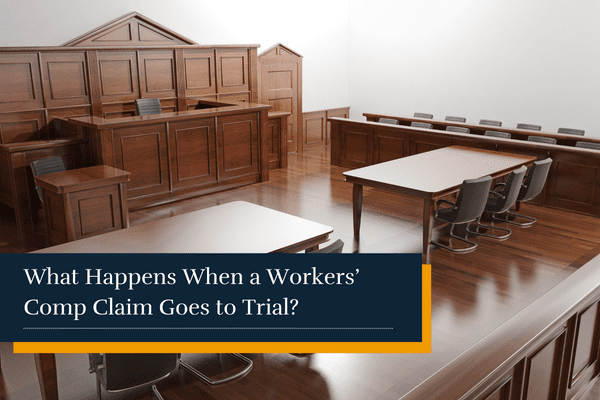
Some workers’ compensation claims go smoothly. After a workplace injury, the employee notifies the employer, the employer accepts the injury as covered, and the employee gets the care and treatment they’re entitled to. In many cases, the employer and the claimant can agree and settle without a trial.
Sometimes, however, workers’ compensation cases do not go that way. An employee may have to take their claim to trial to seek adequate compensation. After both sides present evidence and testimony, a Pennsylvania workers’ compensation judge will issue a ruling.
Having a workers’ compensation claim that goes to trial can be nerve-wracking. But you don’t have to face this challenge alone. The experienced Pennsylvania workers’ compensation attorneys at Calhoon & Kaminsky P.C. want to help you with your hearing. To learn more about what to expect at a workers’ comp hearing, contact us today for a free consultation about your case.
What Happens Before a Workers’ Compensation Hearing?
When you file a Pennsylvania workers’ compensation claim, the Department of Labor and Industry generally assigns your case to a workers’ compensation judge in your county. Your case will then have a preliminary hearing. If you have hired an attorney, your workers’ comp lawyer can attend the preliminary hearing in your place.
Many preliminary hearings serve as status conferences, where the judge asks both sides for a case update. If the judge decides that a formal trial or hearing is necessary, they will order the parties to try to mediate first.
During mediation, you and your attorney will try to negotiate a resolution with your employer or their insurance provider with the help of a neutral third party — the mediator. If you cannot resolve your case in mediation, the parties can request a judge-held settlement conference. If the case still cannot be resolved, the judge will hold a pretrial conference. At a pretrial conference, the parties must present their issues and exchange evidence.
How Do I Get Ready for My Workers’ Compensation Hearing?
The most crucial step in preparing for a workers’ comp hearing is to retain an experienced workers’ compensation attorney. Your attorney can help you organize your evidence and prepare you to testify.
Evidence for a workers’ compensation trial in Pennsylvania can include:
- Medical records
- Medical bills
- Wage records
- Physician reports and testimony
- Job search information
Your workers’ comp attorney should exchange all this evidence with the company’s attorney before the hearing. Your attorney can then review the company’s evidence to anticipate what it may argue at the hearing. The company’s attorney will likely ask you about specific documents when you testify at the hearing. Your attorney can review those documents with you so that you can comfortably testify about them.
You will also want to secure testimony from your treating physician, and consider seeking testimony from any doctor the company hires. An attorney can help you get this testimony through a deposition – a proceeding where attorneys question the doctor under oath, with a court reporter taking a written record.
What Happens During the Workers’ Compensation Hearing?
A workers’ comp hearing is typically held in a one-day trial format, where both sides present evidence and testimony. While the procedure varies by the judge, any judge will expect the employer and the employee to have gathered and organized all the necessary evidence they want to present. Our Pennsylvania workers’ compensation attorneys know many of these judges and their trial procedures.
The parties submit exhibits at the hearing, including any medical reports, unpaid medical bills, and evidence of lost wages. The parties also present evidence through live testimony or deposition transcripts. Before having them testify, the judge will place each witness under oath. The injured worker almost always testifies live. People who witnessed the injury also commonly testify live. Both sides have an opportunity to question each witness. Sometimes the judge will ask witnesses questions as well.
With medical testimony, doctors do not typically testify in person at a hearing. They will provide testimony through a deposition, where a court reporter creates a transcript. Your attorney can use that transcript as evidence at the hearing.
Your testimony will cover many different aspects of your injury. You will want to testify about:
- How the injury occurred
- Your symptoms
- Your treatment
- Your recovery
- How the injury affects your ability to do your job
- Your job search, if the injury keeps you from returning to your old job
Workers’ compensation judges do not typically rule from the bench at the end of a hearing. Instead, the judge will review the exhibits and testimony and issue a written opinion. A judge can take a few months to give an opinion.
Will I Get Less Compensation If I Go to Trial?
The reality is that sometimes a judge issues a ruling less favorable to an injured claimant than the insurance company’s settlement offer. That is one of the reasons why most cases settle – the certainty of a known award can be more appealing than the uncertainty of a possibly greater award.
A knowledgeable Pennsylvania workers’ compensation attorney can review your case to determine its potential value and whether a settlement offer is acceptable. Sometimes submitting your claim to a judge at a hearing is your best chance at getting the compensation you deserve.
Contact Our Pennsylvania Workers’ Compensation Lawyers for a Free Consultation
Pennsylvania’s workers’ compensation laws and the hearing process can be complicated — especially if you’re dealing with an injury and lost income. It is likely your first time dealing with workers’ compensation. Our attorneys have dealt with the process and tried cases many times. Let us help you. Call or contact us online today for a free consultation with an experienced workers’ compensation attorney.
- About the Author
- Latest Posts

